Monitoring Desk
NEW DELHI: Modi govt has taken a controversial step ahead of the general elections in India. The decision to ban Islamic madrasas in the state of Uttar Pradesh has drawn criticism from various quarters.
The Allahabad High Court overturned a 2004 law pertaining to madrasas, effectively prohibiting their operation in the state. This decision could further deepen the divide between the Muslim community and Narendra Modi’s Hindu nationalist govt, especially in the lead-up to the elections.
Iftikhar Ahmed Javed, Chairman of the Uttar Pradesh Board of Madrassa Education, expressed concern about the impact of this decision on the thousands of students and teachers associated with madrasas. Approximately 2.7 million students and over 10,000 teachers across 25,000 madrasas are expected to be affected.
This move follows previous actions by the govt, including the discontinuation of a scheme that provided payments to teachers instructing subjects like mathematics and science in madrasas. The decision had a significant impact on 21,000 teachers in Uttar Pradesh.
Furthermore, reports suggest that the govt is converting several madrasas in the northeastern state of Assam into traditional schools. Critics argue that such measures unfairly target the Muslim community and undermine their religious freedoms.
While the Indian government cited concerns about the quality of education provided in madrasas, critics view these actions as part of a larger pattern of discrimination against Muslims. They argue that Modi’s Hindutva ideology is becoming increasingly apparent through such policies.
The closure of madrasas has raised domestic concerns and also drawn international attention. Human rights organizations, including those from the United States, European Union, and United Nations, are being called upon to address the discrimination faced by Muslims in India.







